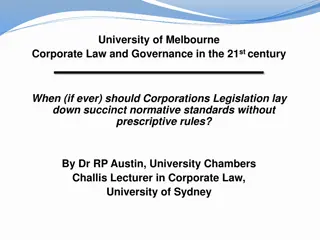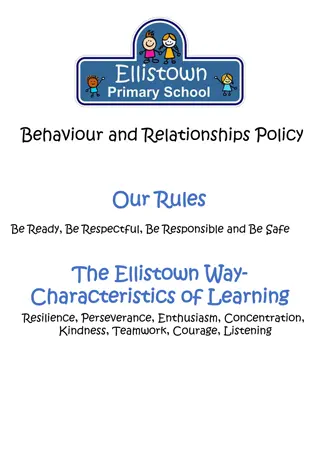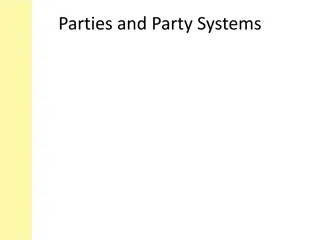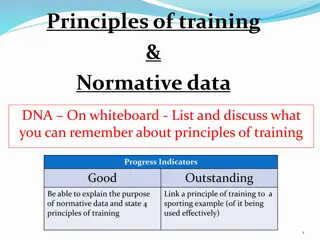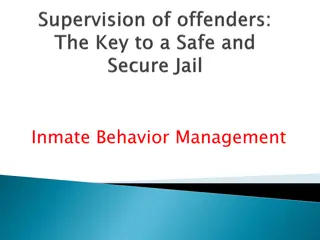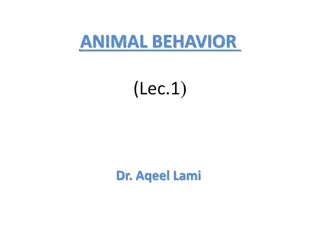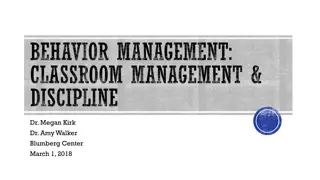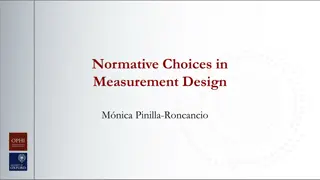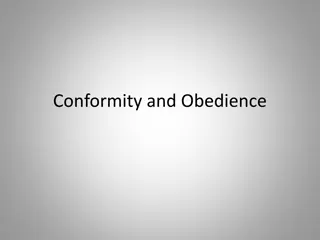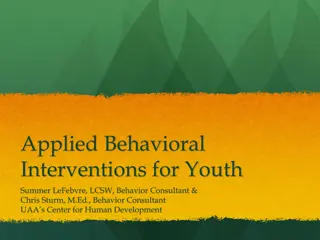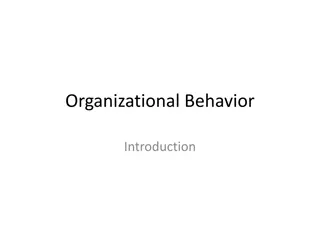Positive Behavior Support Interventions in Education
Learn about Tier 1 Positive Behavior Interventions & Supports (PBIS) developed by California State University and LA Unified School District. Explore evidence-based strategies like effective transitions, praise, choice-making, and establishing routines to promote positive behavior in students. Disco
1 views • 10 slides
Function Based Thinking
Function-based thinking in Missouri Schoolwide Positive Behavior Support, emphasizing data-based decision-making, mission clarity, and effective teaching practices. Understand how behavior is related to the environment and how environmental interventions play a key role in shaping expected behaviors
6 views • 27 slides
Addressing Predatory Behavior in the Fellowship
Predatory behavior, especially towards vulnerable members, is a concerning issue in the fellowship. This behavior includes unwelcome advances, exploitation of power dynamics, and institutional sexism. The discussion on predatory behavior necessitates honest dialogue and a united approach for a safer
3 views • 13 slides
Understanding Human Behavior: Foundations and Complexity
Human behavior encompasses the actions and interactions of individuals influenced by factors like genetics, culture, and situational contexts. It involves observable overt behaviors as well as hidden covert behaviors, with a dynamic interplay between individuals and their environments. Psychologists
8 views • 20 slides
GD Bart Puppy Test: Behavior Scoring System Overview
The GD Bart Puppy Test is a standardized behavioral scoring system designed for puppies at 8 weeks of age, focusing on 21 test components to predict success in canine behavior. Conducted by a team of 3 people, the test evaluates stress signals and responsiveness levels to various stimuli. Multiple e
6 views • 15 slides
Understanding the Role of Board-Certified Behavior Analysts in Supporting Students with Autism in PA School Programs
Pennsylvania Training and Technical Assistance Network (PaTTAN) plays a crucial role in supporting students with autism through the efforts of Board-Certified Behavior Analysts. The increasing number of students eligible for IEPs under the definition of autism necessitates skilled educators who can
0 views • 20 slides
Contrasting Concepts in Political Science: Normative vs Descriptive Approaches
Normative and descriptive concepts in Political Science explore contrasting viewpoints on how things should be versus how they actually are. While normative claims focus on value judgments, descriptive claims deal with facts. These concepts complement each other by providing both theoretical and pra
0 views • 10 slides
Influencing Factors on Voting Behavior: A Comprehensive Analysis
In the realm of voting behavior, factors such as media, social class, age, gender, and more play critical roles. This essay delves into the complexity of factors influencing voting behavior, assessing their relative importance and the balance of their impact. The discussion includes models of voting
0 views • 12 slides
Contemporary Approaches to Corporate Legislation Standards
Exploring the necessity of implementing succinct normative standards without prescriptive rules in corporate legislation, this article by Dr. RP Austin from the University of Sydney delves into various aspects of statutory corporate law, such as equality of opportunity, financial services licensee b
0 views • 22 slides
Understanding the Positive/Normative Distinction in Economics
Textbooks in economics often teach the Positive/Normative Distinction, where Positive Economics deals with facts and Normative Economics focuses on values and opinions. This distinction is a point of debate among scholars, with some arguing that values are intrinsic to all analysis. The debate also
0 views • 28 slides
Behavior and Relationships Policy at Ellistown Primary School
Ellistown Primary School aims to create a safe and respectful environment where everyone is ready to engage in learning. The Behavior and Relationships Policy emphasizes positive behavior reinforcement, clear boundaries, and promoting self-esteem. It focuses on fostering good citizenship, teaching s
0 views • 11 slides
Understanding Psychological Theories of Criminal Behavior
Psychologically-based criminologists attribute criminal behavior to individual factors such as negative early childhood experiences and inadequate socialization, leading to criminal thinking patterns and incomplete cognitive development. Probation and parole practices are influenced by rehabilitatio
0 views • 30 slides
Normative Accents in English: RP and GenAm Overview
Normative English accents, Received Pronunciation (RP) and General American (GenAm), serve as reference points for English learners and speakers globally. RP is associated with the British elite and institutions, while GenAm represents a regionless form of American pronunciation. Both accents, spoke
0 views • 22 slides
Understanding Party Systems in Comparative Politics
Parties in comparative politics play a crucial role in deepening democracy, connecting political society with the State, and maintaining accountability. The definition of a party can be categorized based on normative, motivational behavior, and operational perspectives. The development of party syst
0 views • 16 slides
Understanding Consumer Behavior in Marketing
The design of a marketing program starts with understanding consumer behavior. Consumers, as the end users, play a crucial role in shaping market trends. Producers seek insights into consumer personas, market behaviors, and influencing factors. Management focuses on the consequences of consumer beha
2 views • 26 slides
Analytical School and Kelson's Pure Theory of Law: A Critical Analysis
Kelsen's Pure Theory of Law emphasizes the hierarchy of norms and the normative character of law, free from extra-legal elements. This theory, in contrast to other perspectives like Hart's, aims to maintain the purity of law by isolating strictly legal components. Kelsen's focus on normative behavio
1 views • 15 slides
Principles of Training and Normative Data in Fitness
Explore the essential principles of training, progress indicators, and the purpose of normative data in fitness assessments. Learn how normative data from a general population can help gauge your own fitness levels. Discover fitness tests like the Sit-Up Test and Press-Up Test and how you can use no
0 views • 17 slides
Understanding Psychology: The Science of Behavior and Mental Processes
Psychology is the scientific study of behavior and mental processes. Psychologists study both observable behavior and private mental processes. The primary goals of psychology are to describe, understand, predict, and control behavior. Different branches of psychology, such as applied psychology, cl
2 views • 29 slides
Elements of Social Action: Understanding Human Behavior in Society
Social action plays a vital role in analyzing human behavior within a society. Max Weber's concept emphasizes how actions influence and are influenced by others, holding subjective meanings. Talcott Parsons outlined five components: actor, objective, social situation, normative orientation, and ener
0 views • 9 slides
Understanding Ethics: Foundations and Principles
Ethics, a cornerstone of human behavior, encompasses descriptive, normative, and meta ethical aspects. It delves into the nature of ethics, its definition, and the essence of ethical judgment. Ethics evaluates conduct against moral ideals, aiming to guide moral judgments and actions with regard to t
0 views • 6 slides
Understanding Inmate Behavior Management in Correctional Settings
Inmate Behavior Management in correctional facilities involves supervising inmates, implementing corrective discipline, and fostering a fair and consistent environment. It emphasizes the importance of behavior management plans, identifying undesirable traits in supervision, and passing educational a
0 views • 19 slides
Understanding Human Behavior: Foundations and Factors
Human behavior is a multifaceted subject influenced by genetic makeup, culture, and individual values. It encompasses both overt actions and covert thoughts, a product of the individual and environmental factors. Psychologists study behavior from visible (overt) actions like playing football to inne
0 views • 20 slides
Understanding Normal and Abnormal Behavior: Perspectives and Definitions
Normal behavior varies from person to person and society, influenced by individual preferences and societal norms. Abnormal behavior is characterized by an inability to function effectively or personal discomfort. The concept of normality and abnormality in psychology raises complex questions about
2 views • 8 slides
Understanding Human Behavior: Insights for Social Workers
This material delves into the intricacies of human behavior, exploring factors influencing behavior such as heredity, environment, intelligence, needs, and motives. It covers the concept of human behavior, stages in life from conception to old age, and theories of human development by eminent psycho
2 views • 71 slides
Understanding Animal Behavior and Ecology
Animal behavior encompasses a range of activities such as feeding, breeding, and social interactions. Ethology focuses on studying behavior in natural environments, while behavioral ecology examines ecological aspects like predator-prey interactions. Sociobiology delves into the evolution of social
3 views • 5 slides
Normative Defeaters: A Study on Legal Rules and Exceptions
Exploring the concept of normative defeaters in legal theory, this study delves into the defeasibility and generality of legal rules, using the example of United States v. Kirby to illustrate how sensible construction prevails over literal interpretation. The discussion also touches on generic cases
0 views • 42 slides
Understanding Behavior Management in Classroom Settings
Explore the essential topics of behavior management, classroom strategies, and discipline in educational settings. Delve into the functions of behavior, impact of trauma on learning, and effective management techniques. Learn how to identify underlying reasons for student behaviors, discuss behavior
0 views • 76 slides
Choices in Measurement Design and National Poverty Assessment
This content discusses normative choices in measurement design, normative reasoning, relevance, usability, essential choices for creating an Alternative Poverty Measure (AF Measure), alongside measurement design considerations, and a purpose statement for a National MPI. It emphasizes the importance
0 views • 33 slides
Normative Theories of Social and Fiscal Justice in Historical Perspective
The lecture explores normative theories of social and fiscal justice, focusing on social objective functions, utilitarianism, maximin principle, and general social welfare functions. It discusses the challenges of determining social objectives in a world with conflicting values and beliefs, emphasiz
0 views • 24 slides
Targeting Emotions to Facilitate Behavior Change in Older Adults
Efforts in changing health behavior have traditionally focused on social and cognitive factors, but recent evidence highlights the importance of affective states in decision-making and behavior change. Janey Peterson discusses the role of emotions in achieving and sustaining behavior change to benef
0 views • 11 slides
Grading Criteria for Effort and Behavior in Educational Reporting
Effort and behavior in educational settings are evaluated based on criteria ranging from Excellent to Causing Concern. Pupils demonstrating excellent behavior show respect, responsibility, and positive engagement in learning. Those with good behavior exhibit cooperation and respect for others, albei
0 views • 9 slides
Understanding Communicative Acts on Social Networking Sites
Exploring the taxonomy of communicative acts on social networking sites, this work delves into the impact of design features that influence speech acts, commitment, and normative pressures online. By analyzing common families of communicative acts on SNSs, the research sheds light on how these platf
0 views • 29 slides
Understanding Conformity and Obedience in Social Psychology
Conformity and obedience are key concepts in social psychology. Conformity involves changing perceptions or behavior to fit group norms, influenced by factors like informational and normative influences. Sherif's Autokinetic Effect Experiment demonstrated how individuals conform in ambiguous situati
0 views • 25 slides
Understanding Applied Behavior Analysis (ABA) for Youth Interventions
Applied Behavior Analysis (ABA) is a science focusing on improving human behavior by increasing desired behaviors, teaching new skills, and generalizing behaviors. ABA emphasizes observable behaviors, measurement of behavior change, and the use of interventions in various settings like classrooms an
0 views • 25 slides
PBIS Expectations and Behavior Flowchart
The PBIS flowchart outlines behavior expectations and interventions for minor and major incidents in a school setting. It covers disrespectful behavior, disruption, defiance, property damage, theft, possession of weapons, and more. The flowchart guides teachers and staff on managing and addressing s
0 views • 6 slides
Managing Acting-Out Behavior: A Staff Development Program Review
This review discusses a staff development program created by Geoffrey Colvin, Ph.D., from the University of Oregon, focusing on preventing and managing acting-out behavior in students with emotional disturbance or behavior disorders. The program includes video presentations, strategies for behavior
0 views • 22 slides
Understanding Organizational Behavior and Individual Behavior
Organizational Behavior (OB) is a multidisciplinary field that combines knowledge from various disciplines to study and manage organizations effectively. It emphasizes the application of this knowledge to enhance organizational effectiveness and the well-being of participants. OB is a useful concept
0 views • 38 slides
Update on CSTS Red Book Issue 1 at CSTSWG Workshop in Darmstadt
Final resolutions for 9 RIDs have been accepted and included in the book, with ongoing issues related to ESA RID FF-5 and the CCSDS SLS Coding and Synchronization WG. Additional changes since the Spring meeting include normative specifications, data transfer mode procedures, and resource sharing in
0 views • 12 slides
Function-Based Behavior Support Plans: A Comprehensive Guide
Explore the process of developing Function-Based Behavior Support Plans (BSP) using Functional Behavioral Assessment (FBA). Understand the concepts of function and functional behavior assessment, learn how FBA/BSP fits within a multi-tiered support system, and practice developing BSP for students. D
0 views • 74 slides
Hope Amid Crisis: Normative Ambiguity, the Middle Class, and Investment Fraud in 2000s Venezuela
The study delves into the impact of Stanford Financial Group's investment scheme in Venezuela between 1986-2009, particularly on the middle-class Venezuelans. It explores how normative ambiguity affected the financial decisions of middle-class individuals, highlighting the interplay between futurity
0 views • 10 slides








